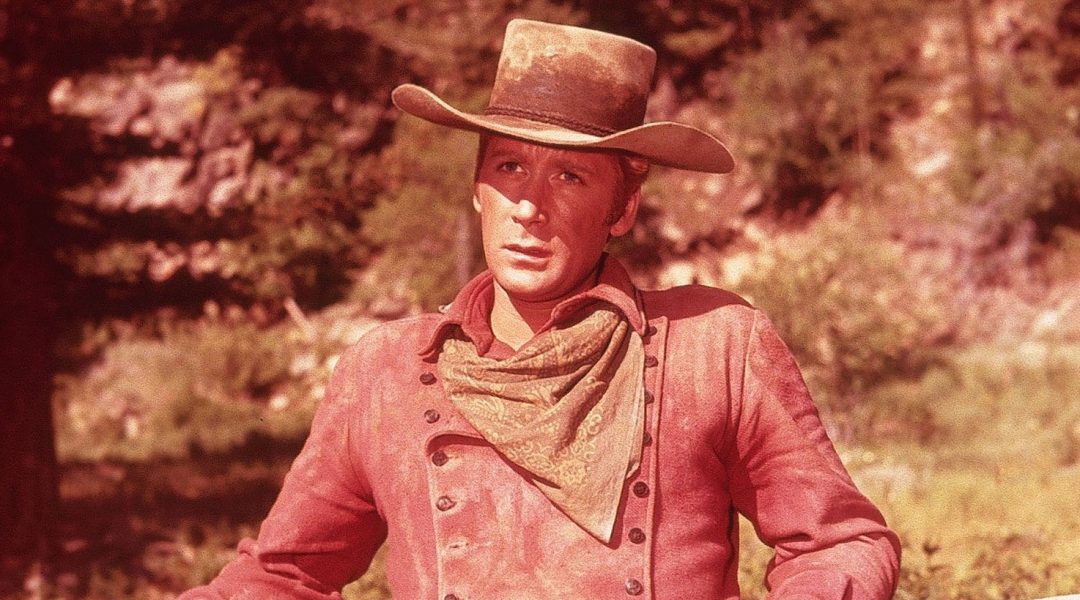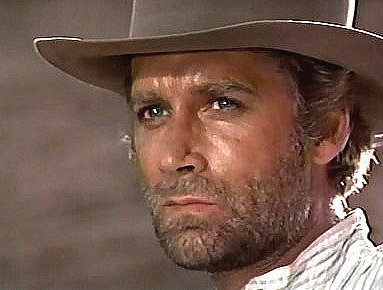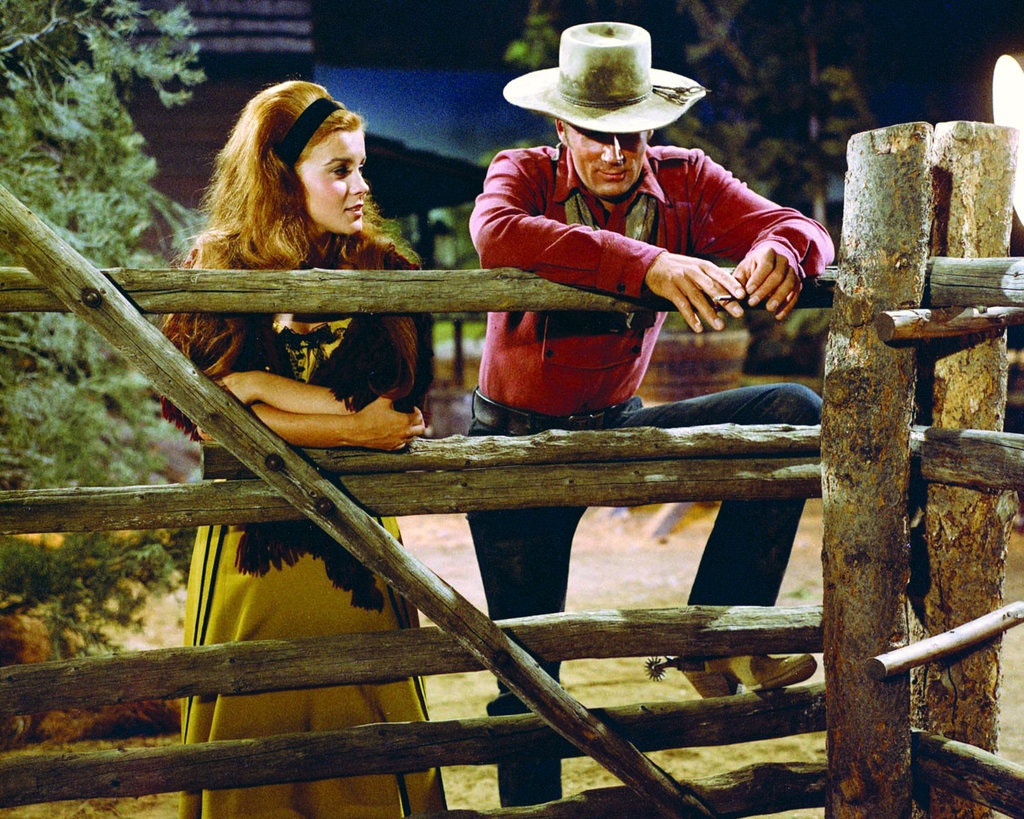The veteran actor played The Ringo Kid in the 1966 remake of Stagecoach.
The C&I crew is offering respectful tips of our Stetsons to actor Alex Cord, who passed away Monday at his home in Valley View, Texas. He was 88.
As is our custom, we don’t mourn deaths — rather, we celebrate lives. So we’ve gone into our archives to retrieve this 2015 interview, which I conducted by phone as Cord, then semi-retired, relaxed in his office at his Texas ranch. Naturally, we got around to talking about the 1966 remake of Stagecoach, in which he starred as The Ringo Kid while backed by an all-star cast that included Ann-Margret, Red Buttons, Mike Connors, Bing Crosby, Robert Cummings, Van Heflin, Slim Pickens, Stefanie Powers. But we started out by focusing on a different sort of western.
Cowboys & Indians: You starred in A Minute to Pray, A Second to Die, one of the better Spaghetti Westerns, back in 1968. Do you have fond memories of making that one?
Alex Cord: That was a fun movie. I had a good time doing it. [Laughs] I think I shot about 40 people in the first five minutes of that film.
C&I: Wasn’t your character supposed to die at the end?
Alex: Originally. But what happened was, the producers liked the film. And they thought they could do a sequel to it, you know, sort of like Fistful of Dollars led to all the other Dollar movies.
C&I: But this was after you’d already shot a death scene?
Alex: [Laughs] Yes. We filmed this thing on a rocky mountain in Spain, where I was ambushed by these bounty hunters and they shot me off my horse. The problem was, the producers didn’t have a very good stunt man around there to double me. I was young and athletic and half-lunatic and I was — and always have been — a very serious horseman, so I said, “I can fall off that horse, and don’t worry about it.”
C&I: Talk about giving your all for your art.
Alex: They padded me up because — well, it was all rocks at the bottom. I had remembered a scene that I liked a lot in Viva Zapata! with Marlon Brando, where they shot him at the end of the movie. Seemed like they shot him a thousand times. He kept curling up into a little ball like a fetus. I thought that was really cool, so I determined that that was the image I wanted to end up leaving. And that’s what we did. We shot that thing, and it was really good, and the fall was good, and it worked out just fine. Except I was bruised for the next four days after fooling around on those damned rocks. And then the producers decided that maybe we could do a sequel, so they just cut out the ending, after I went through all of that.
C&I: Damn.
Alex: Well, it’s the movies. You know, making those movies in Italy then, you had to leave part of your brain at home. It’s a pretty tricky deal, but I must say, I had a great time doing it. And the best part of it for me was getting to work with two guys that I had admired all my life as a kid going to the movies — Robert Ryan and Arthur Kennedy. They were wonderful actors, and vastly different human beings. Ryan was a very reserved gentleman, extremely well-educated, and couldn’t have been kinder and nicer and more fun to work with. Now, Arthur Kennedy had always struck me as kind of dour on film. I never saw him be very lighthearted. But in real life, he was the funniest guy in the world and we laughed all the time. It was just great working with those guys.
C&I: Any other memories of that film you’d like to share?
Alex: Well, you know, they dubbed every sound of it later. They didn’t care if a plane was flying over or not as long as they got a track that they could dub later. For these bit parts, they hired guys that couldn’t speak a word of English, because they didn’t have to say very much. And all of the dialogue was all going to be dubbed by somebody else later, except for Ryan, Arthur and me. Well, there was a scene with this group of outlaws, just three of them. One was kind of an older guy, and they get the drop on me, and they’ve got me at gunpoint because there was a reward for me. This older guy is holding a cocked, single-action Colt 45 in his hand, pointed straight at me.
C&I: Uh-oh.
Alex: I don’t know that he’d ever acted before. He was a schoolteacher in the local village there. And during the scene, he would inadvertently touch the trigger and the hammer would fall. And then, of course, we’d have to cut and do it over again. The director was Italian, and he tried to tell him: “You know, you can’t touch that trigger like that. Because if the hammer falls, that means you just shot the leading man.” But every take, the guy kept doing that. He could not get that through his head.
So we broke for lunch. And at lunchtime [Laughs] I don’t know whatever possessed me to do this. It was not a very cool or smart thing to do, but I’ve got a bit of an evil streak in me, and things were loose enough, you know? I got back there early and I loaded the damned pistol with blanks. Now we’re going to resume, because we had never gotten the shot. So after lunch, we’re going to pick it up where we had left off. We rolled the camera and the guy — sure enough, he’s got the gun and he’s four feet away from me, and he touches the trigger. The hammer falls, the gun goes off — and I dropped to the ground. This poor son of a bitch thought he had killed me. They had to hold him up. He was ready to faint.
C&I: That is pretty damn evil, Alex.
Alex: [Laughs] It was most the evil thing to do. He could’ve had a heart attack. At any rate, we finally explained to him that’s why he cannot touch the trigger.
C&I: That’s one way to break a bad habit.
Alex: Well, yeah. I mean, eventually we got the shot because now he wouldn’t even put his finger on the damned trigger — he was so terrified of the gun. The thing was, he really had thought that he’d killed me. I just dropped to the ground, clutched my heart and laid there. It was part of filming in Italy.
C&I: You mentioned being a horseman. Have you ever competed in riding events?
Alex: [Laughs] Right now, I'm not competing at all. But I used to compete regularly as a team roper, and occasionally in cutting. There’s nothing more fun than riding a cutting horse. Everything else has a little danger attached to it, but cutting is pretty much safe. I mean, you could fall off one easily, but not a lot of people get injured riding cutting horses. I was very lucky — I got to ride some great ones. And I had great trainers helping me.
C&I: About a decade ago, you wrote a novel – A Feather in the Rain – about a Texas rancher and horseman grieving over the loss his son. Did that help you come to terms with the loss of your own son [Damien Zachary Cord, who died at age 26]?
Alex: I take great issue with the word “closure.” There's no “closure.” That's such a BS term. What you have to do with grief is accept it. You have to learn to embrace grief and the loss and accept it as a reality, as part of your life. I am now a man who has lost a son. That is part of who I am. Once you come to that realization, then you can live with it a lot better. Back then, I was paralyzed by [Damien’s death] for a year at least. I almost literally didn't want to get out of bed. Had I not had the horses…
That was my salvation, to get up and ride. I rode every day during that year. That was the only peace I had – when I was on a horse.
C&I: And then you started writing…?
Alex: Yeah. And I had the feeling all the time I was writing the book that my son was standing behind me.
C&I: You have appeared in a wide variety of movies and TV series — everything from a Mafioso in The Brotherhood to a CIA operative in Airwolf. But many people associate you most closely with westerns. Between playing The Ringo Kid in Stagecoach and a Cheyenne brave in Grayeagle and guest starring in scads of TV westerns, you’ve spent enough time in the saddle to earn a Golden Boot.
Alex: Yes, I did. I’m looking at it right now. It’s right on the shelf in front of me here. Yep, the Golden Boot Award. I did those Pro Celebrity rodeos with Ben Johnson for 16 years, up until Ben died. Then Dean Smith kind of picked up the mantle on that, and so we did three or four more with Dean. I’ve been interviewed by some of the cowboy magazines and stuff like that. Western Horseman did about a four-page spread on me when I was playing polo. Yeah. People do associate me with the western lifestyle, and here I am on a ranch in Texas, which is the fulfillment of a lifelong dream. Yeah.
C&I: A couple of final questions. Looking back, do you still marvel at your own audacity for picking up the John Wayne role in Stagecoach? Do you think, “Boy, I must’ve been a nervy young man back then?”
Alex: The funny thing is, just a few years ago, there was a piece on the Stagecoach remake in The New York Times.
C&I: Oh, yes. I know the article you’re talking about. It was written by critic Dave Kehr, and timed to the 2011 release of the film on DVD. He actually had complimentary things to say about it. And about you. In fact, if you call it up from the Internet, you can see the article begins: “In 1966, the bravest man in movies must have been Alex Cord, the Long Island native who stepped into the John Wayne role in Gordon Douglas’s color and CinemaScope remake of John Ford’s 1939 Stagecoach.”
Alex: [Laughs] God, where are you reading that from?
C&I: Right off my computer screen. Hold on a second, and I’ll email you a link to the article.
Alex: [Pauses] Wow. Yeah, the thing that amazed me was that many years would go by — you’re talking more than 40 years — and this guy writes something nice like this. As I recall, it was a huge article. It was whole damned page in the New York Times with photographs and stuff.
C&I: And Kehr says something very nice about you at the end: “He moved into Euro-westerns and television (including a long run of the CBS series Airwolf) and today raises horses and writes novels. That seems to me a happy ending, too.”
Alex: I’ll tell you what — I have had one hell of an interesting life. And I don’t say that with any ego at all. I’m just totally amazed at the turns my life has taken.
C&I: By the way: Did you ever hear from John Wayne before or after you were cast as The Ringo Kid?
Alex: No, I did not. But I have a great letter from Bing Crosby.
C&I: Who played the drunken doctor, the character played in 1939 Stagecoach by Thomas Mitchell.
Alex: I just got up and got ahold of the letter because it’s perma-plaqued — my mom had it perma-plaqued for me — and it hangs on the wall here because it’s Bing’s stationery. It says, “Dear Alex, They ran Stagecoach up here the other night in Oakland. It’s a very impressive film, Alex, bustling with action and every character in it is solid. I suppose some of the distinguished critics will hack at it here and there, but the audience the other night sat on the edge of their seats absolutely spellbound. At the end, when I put the gun on the hotel keeper and told him to turn you loose, it got a 30-second round of applause. I think you’re going to be proud of your performance, Alex, and of being in this picture. All the best, Bing Crosby.”
C&I: Wow.
Alex: Yeah. Isn’t that cool?
















